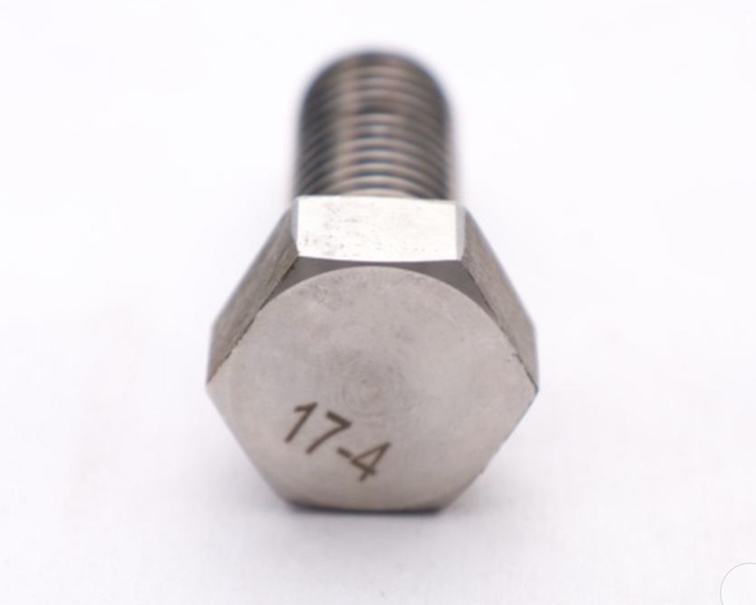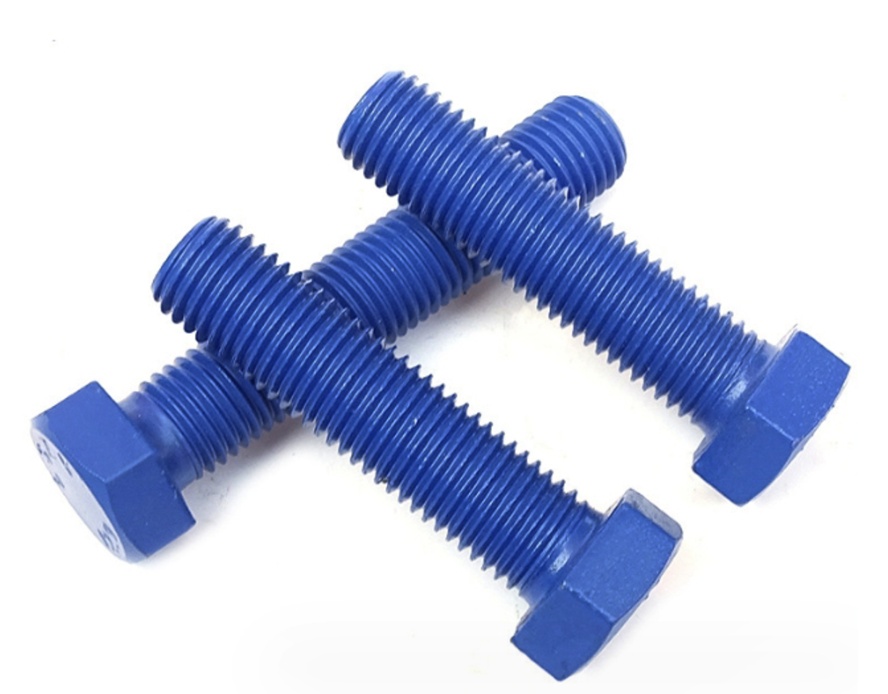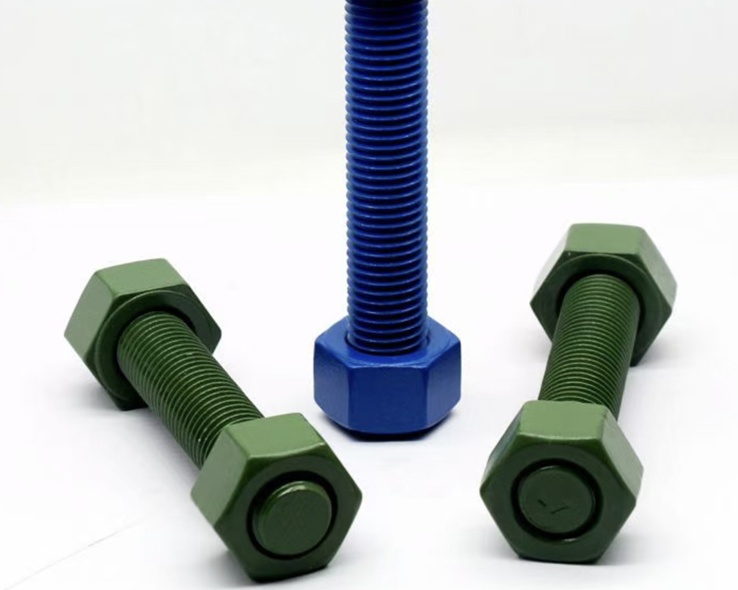What Are “High-Temperature” Stud Bolts?
High‐temperature stud bolts are fasteners designed to retain mechanical strength, dimensional stability, and corrosion/oxidation resistance when exposed to elevated temperatures—typically from 300 °C (572 °F) up to 700 °C (1292 °F) or above. Standard carbon‐steel or low‐alloy studs lose strength or creep at these temperatures, so specialized alloys are used.
For Regular stainless steel and alloy steel fasteners, their upper limit of service temperature is 400°C. When the temperature exceeds 400°C, various properties of the fasteners will decline precipitously. What we refer to as high – temperature fasteners start from 400°C and go up to 1200°C. We can provide fasteners with a service temperature within this range. However, the practical application and raw materials of high – temperature fasteners involve an extremely complex and rigorous process. It covers aspects such as the coefficient of expansion, anti – corrosion and rust – prevention properties, mechanical properties at high temperatures, high – temperature anti – loosening, and high – temperature disassembly of fasteners. Our company can provide professional technical consultations for customers to ensure the application of high – temperature fasteners. Our high – temperature fasteners are mainly applied in heat – treatment equipment, steam turbines, engines, injection molding and hot extrusion equipment, etc. The materials of high – temperature fasteners provided by our company mainly include precipitation – hardening stainless steel, high – temperature stainless steel, and special alloy steel.
Typical High-Temperature Stud-Bolt Materials & Grades introduction
1,Alloy A286 (EN 1.4980 / UNS S66286) ASTM A453 grade 660
- Designation:
- EN/DIN: 1.4980
- UNS: S66286
- ASTM A453 Grade 660 (Classes A, B, C, D)
- Temperature Capability: Up to 650–700 °C (1200–1300 °F) continuous; short‐term up to 760 °C (1400 °F)
- Mechanism: Precipitation‐hardenable austenitic stainless; strengthened by Ni–Cr–Ti precipitates
- Mechanical Properties (Class B typical, aged):
- Tensile ≥ 930 MPa (135 ksi) at 20 °C
- Yield ≥ 620 MPa (90 ksi) at 20 °C
- % Elongation ≥ 25%
- Creep rupture life (~100 h) at 650 °C: ~70–100 MPa stress
- Applications: Turbine exhausts, steam piping, petrochemical heaters, high‐temp flange bolting
- Standards: ASTM A453 (bolt), A453 covers heat‐treated condition; nuts per ASTM A453 grade 660 ; washers per ANSI B18.22.1
2 Inconel® (Nickel-Chromium Alloys) Stud bolt
Several Inconel alloys are popular for stud-bolt applications:
| Alloy | UNS | Max Service T (°C) | Key Features |
|---|---|---|---|
| Inconel X-750 | N07750 | ~650 °C | Precipitation‐hardening nickel‐chromium; good creep; widely used for bolting in turbines and reactors. |
| Inconel 718 | N07718 | ~650 °C | Precipitation‐hardenable, higher strength than X-750; retains > 75% room-T strength at 650 °C; good fatigue/crack resistance. Common in aerospace & power generation. |
| Inconel 625 | N06625 | ~980 °C (short term) | Solid-solution strengthened Ni–Cr–Mo; very good oxidation resistance; excellent corrosion resistance; used for gasketed joints in chemical plants. |
| Inconel 600 | N06600 | ~800 °C | Solid solution, good oxidation; lower strength vs. 625; used for low‐stress bolting in high-temp corrosive service. |
| Inconel 675 | N06675 | ~980 °C | Superior creep/rupture vs. 600/625; often used for headers/supports but less common for studs. |
Note: For typical high-temperature flange bolting up to 600–650 °C, X-750 or 718 are the workhorses. For service above 650 °C (or more aggressive corrosion), shift to 625 or specialty “Alloy” grades.
3,Stainless Steels (High-Alloy, Solid-Solution)
- 316H/321/347 Stainless:
- Service up to ~550 °C
- 316H: Slightly higher C version of 316 for creep resistance
- SS321 ASTM A193 B8C /SS347.ASTM A193 B8T : Ti or Nb stabilized, fewer problems with carbide precipitation at 550 °C, but strength still lower than A286
- ASTM A193 B8/B8M (304/316 stainless) – service up to ~550 °C (low strength)
4,High-Temp Carbon / Low-Alloy Steels
ASTM A193 B16 (2½ Cr—1 Mo steel) – service up to ~500 °C
Stud Bolt material grade table for different temperatures
By following these guidelines—selecting the correct alloy/grade, confirming standard compliance, and ensuring proper installation—you can ensure reliable, long-life performance for bolting in high‐temperature applications.
| Stud Bolt Grade | Code | Standard | Temperature |
| 2.4851/UNS N06601/Alloy601 | NiCr23Fe | DIN17742/EN10095/ASTM B166 | 1200℃ |
| 2.4633/UNS N06025/Alloy602 | NiCr25FeALY | DIN EN 10302/ASTM B166 | 1200℃ |
| 2.4851 | NiCr23Fe | DIN EN10095 | 1200℃ |
| 2.4889 | NiCr28FeSiCe | DIN EN10095 | 1170℃ |
| 1.4854 | X6NiCrSiNCe35-25 | DIN EN10095 | 1170℃ |
| 1.4762 | X10CrAISi25 | DIN EN10095 | 1150℃ |
| 2.4816/UNS N06600/Alloy600 | NiCr15Fe | DIN17742/EN10095/ASTM B166 | 1150℃ |
| 1.4841/AISI310S/AISI314 | X15CrNiSi25-21 | EN10095/SEW470 | 1150℃ |
| 1.4762/SICRO12 | X10CrAISi25 | EN10095/SEW470 | 1150℃ |
| 2.4665/UNS N06002/Alloy X | NiCr19NbMo | ASTM B572 | 1100℃ |
| 2.4663/UNS N06617/Alloy617 | NiCr23Co12Mo | ASTM B166 | 1100℃ |
| 1.4864/Alloy330 | X12NiCrSi36-16 | EN10095/SEW470 | 1100℃ |
| 1.4835/Alloy253 MA | X9CrNiSiNCe21-11-2 | EN10095 | 1100℃ |
| 1.4835 | X9CrNiSiNCe21-11-2 | DIN EN10095 | 1100℃ |
| 1.4877 | X6NiCrNbCe32-27 | DIN EN10095 | 1100℃ |
| 1.4872 | X25CrMnNiN25-9-7 | DIN EN10095 | 1100℃ |
| 1.4841 | X15CrNiSi25-21 | DIN EN10095 | 1100℃ |
| 2.4816 | NiCr15Fe | DIN EN10095 | 1100℃ |
| 1.4749 | X18CrN28 | DIN EN10095 | 1100℃ |
| 1.4845/AISI310/AISI3105 | X8CrNi25-21 | EN10095/SEW470/ASTM A276 | 1050℃ |
| 1.4864 | X12NiCrSi35-16 | DIN EN10095 | 1050℃ |
| 1.4886 | X10NiCrSi35-19 | DIN EN10095 | 1050℃ |
| 1.4887 | X10NiCrSiNb35-22 | DIN EN10095 | 1050℃ |
| 1.4821 | X15CrNiSi25-4 | DIN EN10095 | 1050℃ |
| 1.4876 | X10NiCrAITi32-21 | DIN EN10095 | 1050℃ |
| 1.4818 | X6CrNiSiNCe19-10 | DIN EN10095 | 1050℃ |
| 1.4845 | X8CrNi25-21 | DIN EN10095 | 1000℃ |
| 1.4742 | X10CrAISi18 | DIN EN10095 | 1000℃ |
| 1.4828/AISI3095 | X15CrNiSi20-12 | EN10095/SEW470/ASTM A276 | 1000℃ |
| 1.4742/SICRO 10 | X10CrAISi18 | EN10095/SEW470 | 1000℃ |
| 2.4634/UNS N13021/Alloy 105 | NiCo20Cr15MoAITi | ASTM B637 | 950℃ |
| 1.4876H/Alloy800H | X10NiCrAITi32-20H | ASTM B408 | 950℃ |
| 2.4969/UNS N07090/Alloy90 | NiCr20Co18Ti | DIN EN10302/BS 2HR2 | 920℃ |
| 1.4876HT/Alloy 800HT | X10NiCrAITi32-20HT | ASTM B408 | 900℃ |
| 1.4878/AISI 321H | X8CrNiTi18-10 | EN10095/SEW470 | 850℃ |
| 1.4724/SICRO 9 | X10CrAISi13 | EN10095/SEW470 | 850℃ |
| 1.4736 | X3CrAITi18-2 | DIN EN10095 | 850℃ |
| 1.4828 | X15CrNiSi20-12 | DIN EN10095 | 850℃ |
| 1.4833 | X12CrNi23-13 | DIN EN10095 | 850℃ |
| 2.4856 | NiCr22Mo9Nb | DIN EN10095 | 850℃ |
| 1.4724 | X10CrAISi13 | DIN EN10095 | 850℃ |
| 1.4878 | X8CrNiTi18-10 | DIN EN10095 | 800℃ |
| 1.4713 | X10CrAISi7 | DIN EN10095 | 800℃ |
| 2.4952/UNS N07080/Alloy 80A | NiCr20TiAI | DIN EN10269/ASTM B 637 | 800℃ |
| 1.4713/SICRO 8 | X10CrAISi7 | EN10095/SEW470 | 800℃ |
| 1.4981 | X8CrNiMoNb16-16 | 750℃ | |
| 2.4668/UNS N07718/Alloy 718 | NiCr19Fe19Nb5Mo3 | DIN EN 10269/ASTM B637 | 700℃ |
| 1.4986wk | X7CrNiMoBNb16-16 | DIN EN 10269/2 | 670℃ |
| 1.4980/Alloy268/660A/B/C/D | X6NiCrTiMoVB25-15-2 | DIN EN10269/ASTM 453 | 650℃ |
| 2.4669 | NiCr15Fe7TiAI | 650℃ | |
| 2.4952 | NiCr20TiAI | 600℃ | |
| 1.498 | X6NiCrTiMoVB25-15-2 | 600℃ | |
| 1.4982 | X10CrNiMoMnNbVB15-10-1 | 600℃ | |
| 1.4986 | X7CrNiMoBNb16-16 | DIN EN 10269 | 600℃ |
| 1.7233 | 42CrMo5-6 | 600℃ | |
| 1.4923 | X22CrMoV12-1 | DIN EN 10269 | 600℃ |
| 1.4913 | X19CrMoNbVN11-1 | DIN EN 10269 | 600℃ |
| 1.7711 | 40CrMoV4-6 | DIN EN 10269 | 550℃ |
| 1.7709 | 21CrMoV5-7 | DIN EN 10269 | 550℃ |
| 1.7218 | 25CrMo4 | DIN EN 10269 | 550℃ |
| 1.4562/UNS N08031/Alloy31 | X1NiCrMoCu32-28-7 | ASTM B581/B649 | 550℃ |
| 1.7711 | 40CrMoV4-6 | DIN EN 10269 | 550℃ |
| 1.4913 | X19CrMoNbVN11-1 | DIN EN 10269 | 550℃ |
| 1.4948 | X6CrNi18-10 | 550℃ | |
| 1.4429 | X2CrNiMoN17-13-3 | 550℃ | |
| 1.4401 | X5CrNiMo17-12-2 | 500℃ | |
| 1.4404 | X2CrNiMo17-12-2 | 500℃ | |
| 1.4303 | X4CrNi18-12 | DINen10269 | 500℃ |
| 1.4301 | X4CrNi18-10 | 500℃ | |
| 1.4307 | X2CrNi18-9 | 500℃ | |
| 1.7729 | 20CrMoVTiB4-10 | 500℃ | |
| 1.7729 | 20CrMoVTiB4-10 | DIN EN 10269 | 500℃ |
| 1.7225 | 42CrMO4 | DIN EN 10269 | 500℃ |
| 2.4858/UNS N08825/Alloy825 | NiCr21Mo | DIN17744/17752/ASTM B425 | 450℃ |
| 2.4856/UNS N06625/Alloy625 | NiCr22Mo9Nb | ASTM B446/B 564/E112 | 450℃ |
| 2.4816/UNS N06600/Alloy600 | NiCr15Fe | ASTM B 166 | 450℃ |
| 2.4605/UNS N06059/Alloy59 | NiCr23Mo16AI | ASTM B574/B 564 | 450℃ |
| 2.4610/UNS N06455/Alloy C4 | NiMo16Cr16Ti | ASTM B574/B 564 | 400℃ |
| 2.4602/UNS N06022/Alloy C22 | NiCr21Mo14W | ASTM B574/B 564 | 400℃ |
| 1.4571/AISI 316Ti | X6CrNiMoTi17-12-2 | DIN EN 10088-3/10272 | 400℃ |
| 1.4541/AISI 321 | X6CrNiTi18-10 | DIN EN 10088-3/10272 | 400℃ |
| 1.4539/AISI 904L | X1NiCrMoCu25-20-5 | DIN EN 10088-3/10272 | 400℃ |
| 1.4529/Alloy926 | X1NiCrMoCu25-20-7 | DIN EN 10088-3/10272 | 400℃ |
| 1.4429/AISI 316LN | X2CrNiMoN17-13-3 | DIN EN 10269/10272 | 400℃ |
| 1.4404/AISI 316L | X2CrNiMo17-12-2 | DIN EN 10269/10272 | 400℃ |
| 1.4923 | X22CrMoV12-1 | DIN EN 10269 | 400℃ |
| 1.7225 | 42CrMo4 | DIN EN 10269 | 400℃ |
| 1.7709 | 21CrMoV5-7 | DIN EN 10269 | 400℃ |
| 1.7258 | 24CrMo5 | 400℃ | |
| 1.7219 | 26CrMo4 | 400℃ | |
| 1.7218 | 25CrMo4 | DIN EN 10269 | 400℃ |
| 1.4571 | X6CrNiMoTi17-12-2 | 400℃ | |
| 1.739 | X15CrMo5-1 | 400℃ | |
| 1.1133 | 20Mn5 | 400℃ |


